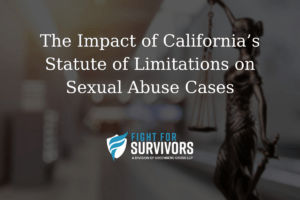
Understanding the Statute of Limitations in California
The California statute of limitations plays a crucial role in determining how long sexual assault survivors have to seek justice through the legal system. For years, restrictive deadlines prevented many abuse victims from pursuing legal recourse, particularly in cases of child sexual abuse where trauma often delays disclosure. However, recent changes to California law have expanded the timeframe for survivors to file both civil claims and criminal charges against those responsible.
Survivors of sexual assault often face immense psychological injury, making it difficult to come forward immediately. Many do not report the abuse or file a sexual assault claim until years or even decades later. Recognizing this, lawmakers have reformed the statute of limitations to allow more survivors—both children and adults—the opportunity to pursue legal action.

How the California Statute of Limitations Affects Survivors
Contact Us For A Free Legal Consultation. No Fee.
Call (833) 55-FIGHTUnder the new California law, those who have suffered abuse may have additional time to file a sexual assault lawsuit or civil lawsuit. The statute of limitations varies depending on whether the survivor was a child or an adult when the sexual assault occurred.
- For childhood sexual assault survivors, the California Child Victims Act has significantly extended the statute of limitations. Previously, survivors of childhood sexual abuse had until the age of 26 to file a civil claim. Now, they can file until the age of 40 or within five years of discovering the connection between their abuse and its impact on their mental health.
- For adult sexual assault survivors, the law allows individuals to file civil claims within 10 years of the assault occurring or within three years of discovering psychological injury related to the assault.
These reforms are critical for those who have experienced sexual assault, as trauma often prevents immediate reporting. Survivors who were sexually abused as children or adults now have greater access to justice, ensuring that crimes committed against them do not go unaddressed.
The California Child Victims Act and Its Impact
The California Child Victims Act provides a crucial legal path for those who suffered childhood sexual abuse. One of the most significant aspects of this law was the creation of a three-year “lookback window,” which temporarily lifted the statute of limitations for filing a sexual assault civil claim. This allowed survivors of child sex abuse to file legal claims even if the original deadline had passed.
Although the window closed at the end of 2022, the impact remains significant, as many survivors who had long been denied justice were finally able to seek compensation through a civil lawsuit. Even outside of this lookback period, childhood victims of sexual abuse now have significantly more time to file civil claims, helping them hold perpetrators accountable.
Legal Options for Survivors of Sexual Assault
Survivors of sexual assault have multiple legal avenues available under California law. These include:
- Filing a civil lawsuit to seek compensation for the harm suffered, including lost income, medical expenses, and emotional distress.
- Filing criminal charges against the perpetrator when applicable, ensuring that they face consequences for the abuse.
- Seeking a settlement agreement that provides financial compensation without requiring a trial.
- Pursuing legal action against institutions or organizations that failed to protect victims from sexual abuse.
For many survivors, seeking justice is not just about financial compensation but also about holding perpetrators accountable and preventing further harm to others. The extended statute of limitations in California makes it possible for more survivors to take these steps.

The Importance of Legal Support for Survivors
Navigating the legal system after suffering abuse can be overwhelming. Compassionate attorneys who understand the complexities of sex abuse cases can help survivors file civil claims, understand their rights, and seek fair settlements. A confidential consultation with an experienced attorney can provide survivors with the guidance they need to move forward with their case.
No matter how long ago the abuse occurred, survivors deserve the opportunity to seek justice. The changes to California’s statute of limitations reflect an important shift in how the legal system treats sexual abuse survivors, ensuring they have the time and resources needed to take legal action.
Frequently Asked Questions
What should I do if I was sexually assaulted years ago?
Even if the assault occurred many years ago, you may still have legal options. California has extended the statute of limitations for both civil claims and criminal lawsuits. Speaking with an attorney can help you determine if you are still eligible to file a claim.
Can I file a lawsuit if I was sexually abused as a child?
Yes. Under the California Child Victims Act, those who experienced childhood sexual assault have until the age of 40 or five years from the discovery of their abuse’s impact to file a lawsuit.
What compensation can I seek in a civil claim?
Survivors may be eligible to seek compensation for medical expenses, psychological injury, lost income, and pain and suffering. In some cases, punitive damages may also be awarded.
How do I know if my case qualifies under the new California law?
Each case is unique, but California’s updated statute of limitations gives more survivors the opportunity to pursue legal action. An attorney can review your case and help you understand your legal rights.
How can I get started with a legal claim?
A confidential consultation with an experienced attorney can provide the information you need to take the next steps. Legal support can help ensure you receive the justice and compensation you deserve.
Experienced Attorneys Who Will Listen And Fight For You
Speak To An Attorney Now »